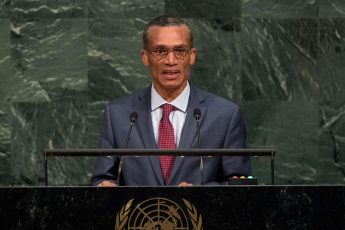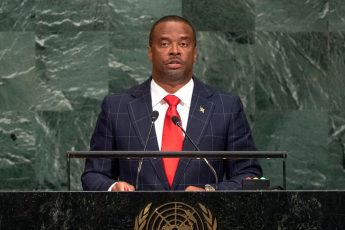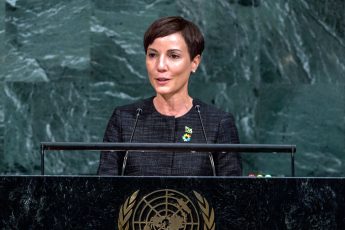At UN General Assembly’s 72nd general debate Ministers for Foreign Affairs of five Caribbean nations united their voices in a common statement on the role climate change has played in the hurricane season of 2017.
In the speech delivered on September 23d Dennis Moses, the Minister for Foreign Affairs of Trinidad and Tobago questioned how, after the spate of recent catastrophic events in the Caribbean, South Asia and elsewhere, one could deny that “climate change is real, and it is upon us.”
Shifting weather patterns, global warming and rising sea levels are impacts of climate change and, extending his nation’s condolences and solidarity to those affected, emphasized that resources, cooperation and collaboration of the international community will be required to help rebuild and build back better.
“The events of the last months in the Caribbean once more remind us all that small island developing States remain at the forefront of the impact of climate change,” Mr Moses stated.
Yet, in light of their re-categorization based on out-dated formulae of gross domestic product (GDP) per capita, Caribbean countries will not qualify for aid and development assistance.

“I join my Caribbean colleagues in calling for a multidimensional approach that takes into consideration real national needs and priorities, as well as these extraordinary circumstances, to provide access to development assistance, aid and debt relief, as the Caribbean region embarks on the arduous task of recovery, rehabilitation and reconstruction together,” Mr. Moses stressed.
Noting that oceans cover three-quarters of the earth’s surface and contain over 95 percent of its water, he called “indisputable” the critical importance of its conservation. As an island State, Trinidad and Tobago is highly vulnerable to the unprecedented rate of marine biodiversity loss and the impacts of unsustainable practices on the marine environment.
He also highlighted that Trinidad and Tobago supported multilateralism and is committed to working collectively to find enduring and sustainable solutions to the many global challenges facing the world today.
“We must all do our part in this noble endeavour for the good of humanity!” he concluded.
Also taking the podium, Mark Anthony Brantley, Minister for Foreign Affairs for Saint Kitts and Nevis, spoke in depth about ensuring a sustainable planet – offering thoughts and prayers for those impacted by the three hurricanes in the Caribbean and the two recent earthquakes in Mexico.
He highlighted the various countries and territories that suffered devastation, noting unimaginable destruction in a wide swathe of the Caribbean. Lives have been lost; homes and infrastructure destroyed; economies reduced to tatters, and years of development wiped out.
“Hurricane season for 2017 is not over yet,” he warned.

Pointing to “irrefutable” science, Mr Brantley stated: “Our oceans continue to get warmer due to our continued abuse of our Planet Earth.” He advocated for treating these phenomena not as natural disasters but as the man-made disasters they are, appealing for a reduction in greenhouse gas emissions and all other actions that aggravate the effects of climate change.
“We cannot continue to abuse our Planet and expect to remain unscathed,” he emphasized.
After expressing her country’s condolences and support for the Caribbean nations affected by the recent national disasters, Kamina Johnson Smith, Jamaica’s Minister for Foreign Affairs and Foreign Trade, told the Assembly that for her region, climate change is an existential issue that requires urgent and effective action.

Ms Smith announced that last April Jamaica ratified the Paris Agreement, adding that island States were at the forefront of the negotiations. Noting that while contributing the least carbon emissions, islands bear the brunt of the damage, pointing to the risks climate change poses to tourism, which plays a critical role in ensuring sustainable and inclusive economic growth and job creation for Jamaica. “We implore all Member States to abide by the commitments of the Agreement,” Ms Smith said.
Original source: UN
Posted on 23 September 2017

